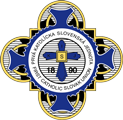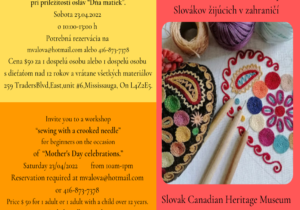Submitted by: Daniel J. Spegar - Branch 10 President
St. John the Baptist Society, Branch 10 of the First Catholic Slovak Union, Olyphant, Pennsylvania will celebrate the 125th Anniversary of its founding in 2014. Originally named, “The Olyphant Society of St. John the Baptist,” it is one of the oldest Slovak societies in America, organized on September 20, 1889. It was founded and chartered one year before Father Stephen Furdek founded the First Catholic Slovak Union in Cleveland, Ohio in September 1890.
The peak of Slovak immigration to America occurred from 1880 to 1910. More than 550,000 Slovaks, about twenty-two percent of the total population of Slovakia, settled in the United States during this time period. The promise of freedom and opportunity was the driving force in this immigration. In America, they were able to improve their way of life and preserve their faith and the Slovak culture.
The majority of these Slovak immigrants arrived at the Port of New York, and settled in many cities and towns of the eastern United States. Almost every mill, factory or mine employed Slovaks. With a strong work ethic, they were valued employees. The inability to speak English was a constant problem, but there was someone in each Slovak neighborhood to translate and help. Attendance at night school to learn the English language was common.
Life in America was not easy for the immigrants. The European idea that the streets of America were “paved with gold” was soon lost. The dust, dirt and mud, along with overcrowded towns and households, were the reality. Homesickness also forced many families to second-guess their decisions to come to America. Work- related disasters, injuries and illnesses resulted in many families becoming destitute. Mining companies often required the oldest son of an injured or deceased miner to replace him so that coal production and output would continue. Mining companies measured the enormity of a mine disaster by how many mules were killed, not men. Mules had to be purchased; men were expendable.
The economic and social needs of this time led Slovaks to form groups called “lodges.” These lodges provided fraternal help to families in time of sickness or death, and were also centers of social, cultural and athletic activities. Dances were common and many future couples met there. Athletic teams and events were organized, and provided outlets for friendship and entertainment.
“The Olyphant Society of St. John the Baptist” was founded on September 20, 1889 and was chartered and incorporated on December 6, 1889. The founders were Joseph Flesher, Andrew Friedel, Andrew Holomko, James Mura, and Joseph and Stephen Pendell. Joseph Flesher was elected “Predseda a Pokladnik” (President and Treasurer). The Society had 26 members at the end of 1889.
The early years of the Society were difficult. Membership was down to three individuals at one point. Joseph Flesher did not give up, though, and worked very hard to preserve the Society. In 1891, a young man, Michael Bosak, moved from Hazleton, Pennsylvania to Olyphant and purchased the Glinsky Inn for $75. He joined the Society and, with his background and abilities, became bookkeeper. He sparked new interest in the Society and, from that time, the organization grew in strength and numbers. Mr. Bosak served as President from 1906-1910. Because of his growing business and banking interests, he resigned the position of Branch 10 President, but remained active in the leadership of the First Catholic Slovak Union on the national level.
Mr. Bosak was elected Supreme Auditor at the national First Catholic Slovak Union Convention in 1901, followed by his election to Supreme Treasurer in 1902, a post he held for twelve years. He was instrumental in forming Junior Branches and was a leading advocate for the purchase, including assistance with financial arrangements, of land in Middletown, Pennsylvania – known today as the Jednota Estates. As his banking interests grew, he declined reelection at the 1914 Convention at Harrisburg. However, Mr. Bosak was appointed to Finance Committee chairman, a position he held until 1920, when he was elected Honorary President of the First Catholic Slovak Union.
Michael Bosak went on to become the first American millionaire of Slovak extract, and was an advocate and signer of the 1918 “Pittsburgh Agreement” which sought autonomy for the fledgling Republic of Czecho-Slovakia following World War I. His investments allowed Branch 10 to become one of the wealthiest small town Societies in America. Despite the economic hardships of the Great Depression, the Branch still collects dividends from investments made almost 100 years ago.
John Bosak, a younger brother to Michael, also played an important role in the growth and development of Branch 10. John became Financial Secretary in 1911 and held this position for 64 years, until his passing in 1976.
Countless other members were very active in the affairs and success of Branch 10 from its 1889 beginnings. These individuals are honored and remembered each year, along with our current members, at our annual Communion Mass and Breakfast. Held in June on the Sunday nearest to the Feast of St. John the Baptist, the Society will celebrate the 20th anniversary of this special religious and fraternal event in 2014.



